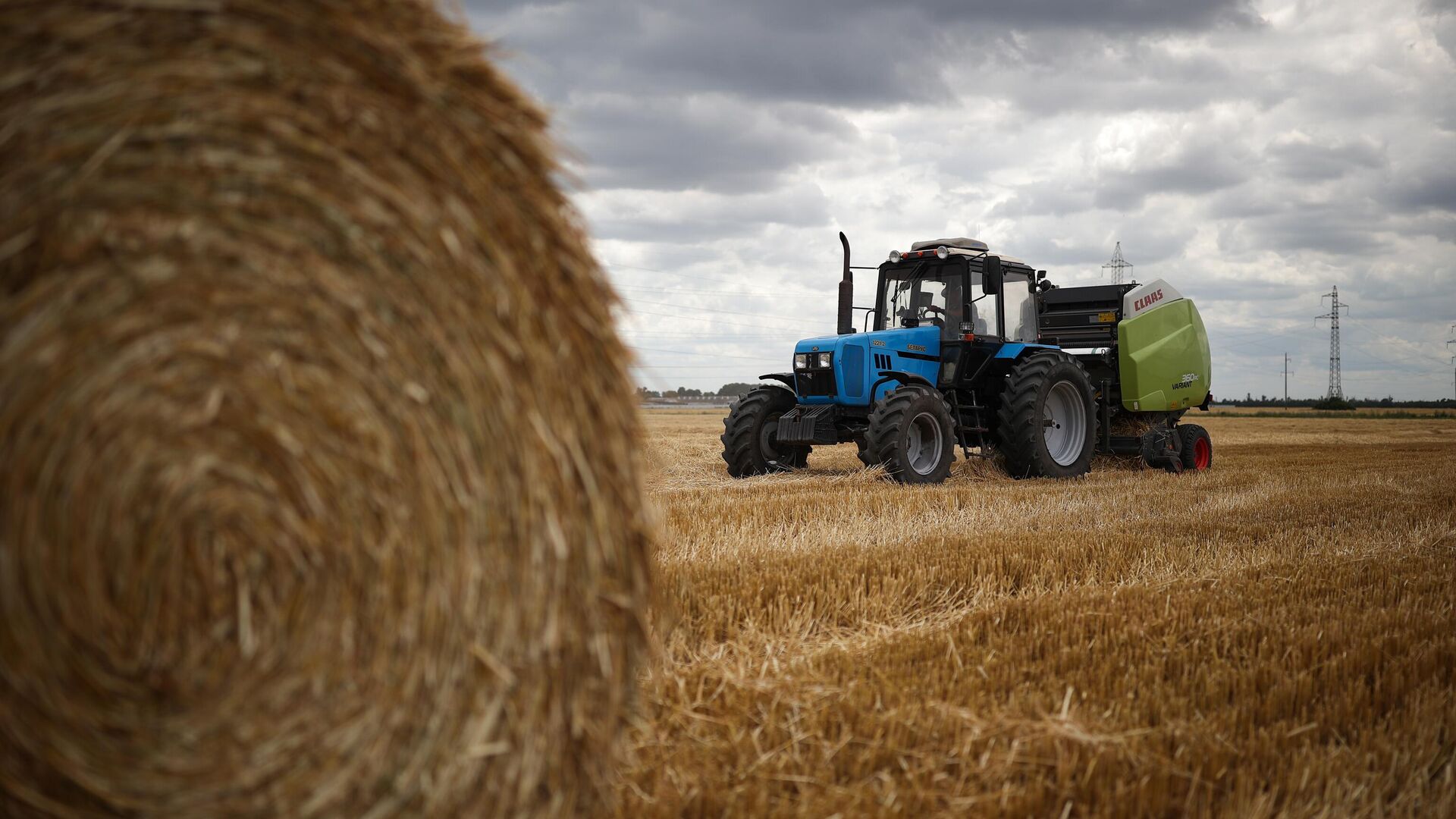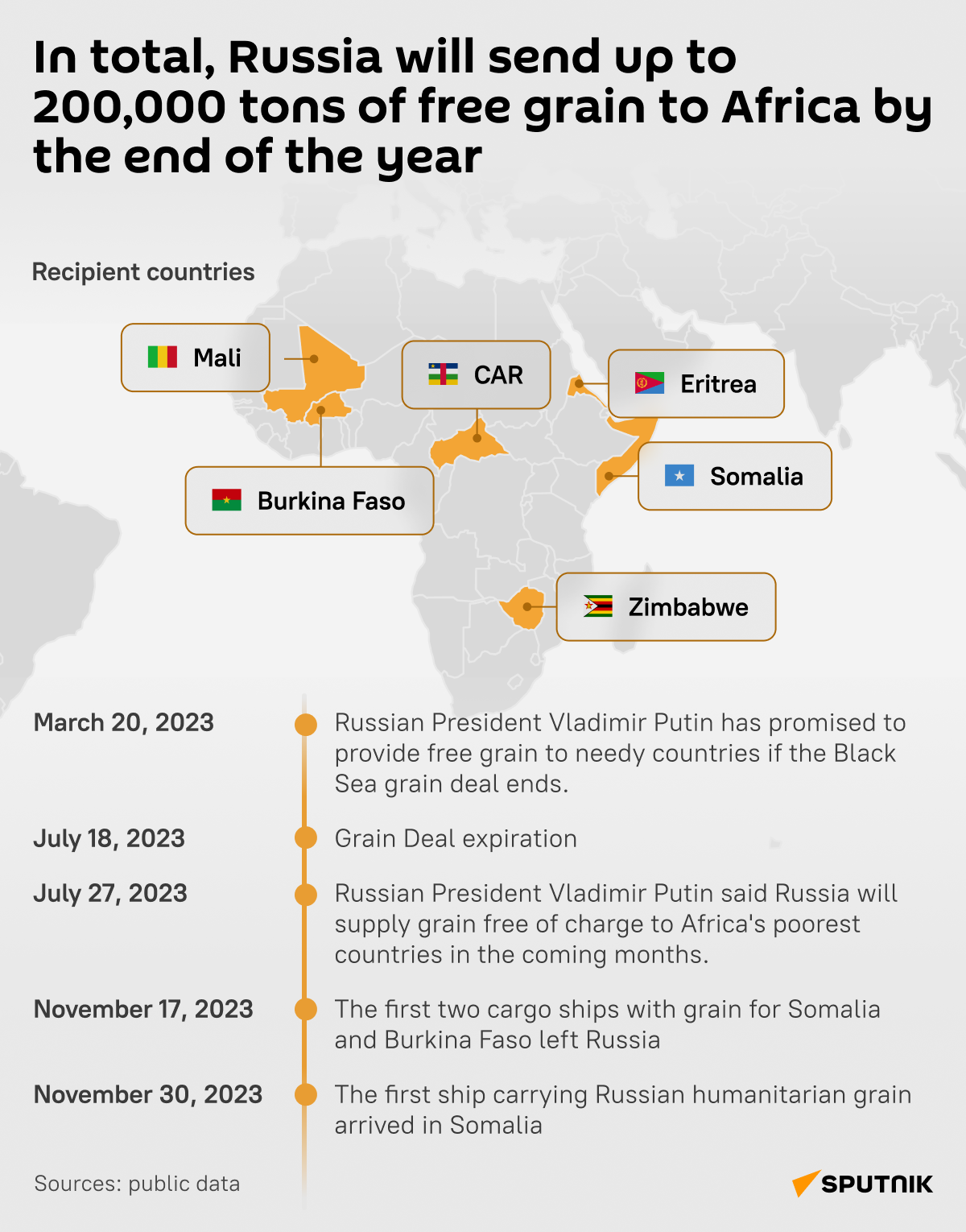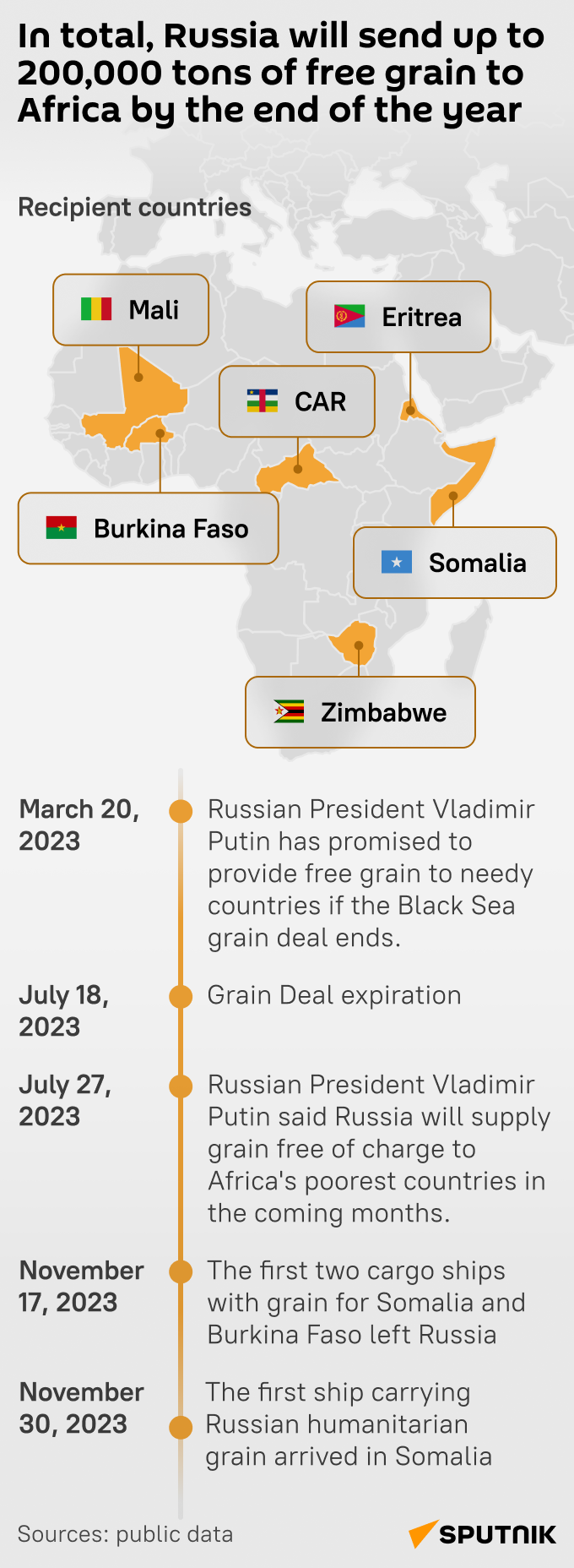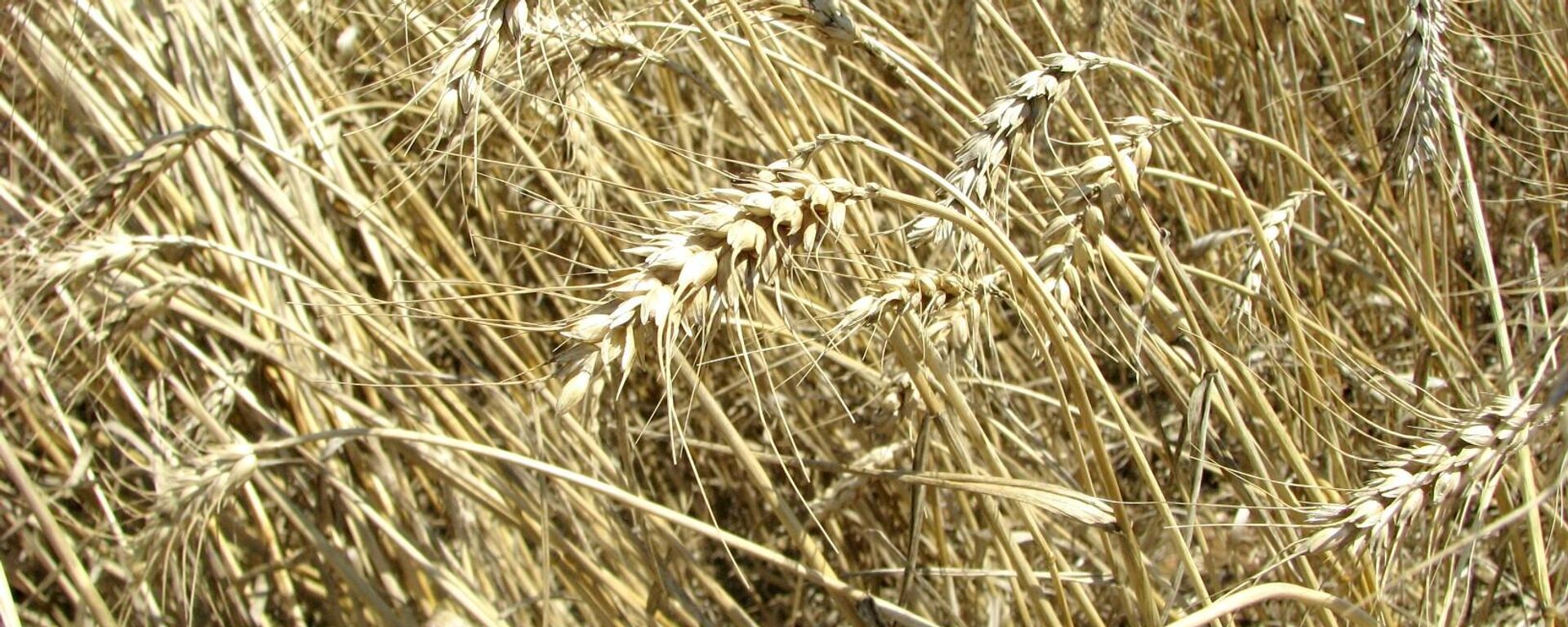https://en.sputniknews.africa/20231203/russia-building-on-soviet-legacy-by-supplying-africa-with-grain-nigerian-expert-says-1063924583.html
Russia Building on Soviet Legacy by Supplying Africa With Grain, Nigerian Expert Says
Russia Building on Soviet Legacy by Supplying Africa With Grain, Nigerian Expert Says
Sputnik Africa
On Thursday, a ship from Russia loaded with 25,000 tons of humanitarian wheat left for Somalia. The East African country thanked Russia for the aid, saying... 03.12.2023, Sputnik Africa
2023-12-03T12:53+0100
2023-12-03T12:53+0100
2023-12-03T12:53+0100
opinion
africa insight
vladimir putin
russia
somalia
burkina faso
sputnik
russia-africa cooperation
black sea grain initiative
grain
https://cdn1.img.sputniknews.africa/img/07e7/0c/03/1063925279_0:166:3072:1894_1920x0_80_0_0_0aaa703192070657c2138f30679d164e.jpg
By sending through grain shipments to the Global South, Russia is sending a message that it's a "reliable partner that will work to match words with action" and building on the Soviet legacy of holding on to promises to support Africa, Ovigwe Eguegu, a Nigerian policy adviser at the Development Reimagined consultancy, told Sputnik.The expert recalled that the current grain supplies are the implementation of a number of Russian promises made by Russian President Putin during the Russia-Africa summit in St. Petersburg.Eguegu believes that the recent shipment of grain to Somalia will play an important role in solving the food crisis in the East African country.West's ReactionAnswering the question of whether Russia should expect another propaganda campaign against Russian aid, the Nigerian expert said that Western countries will try to denigrate the supply of grain to Africa as soon as they hear a positive reaction from Africans.Concluding the interview, Sputnik discussed with Eguegu the notable differences between grain supplies under the Black Sea Grain Initiative and the Russian supply strategy.Eguegu stressed that of the first 16 ships that left Ukraine's Black Sea ports, none of them went to Africa, and only the 17th or 18th ship eventually reached the Horn of Africa. Owigwe believes that the continent was used to put pressure on countries, especially Russia, to reach an agreement on grain supplies.Moreover, Eguegu exposed the hypocrisy of Western propaganda, which began to claim that the Russian grain deliveries were not charity, but that Russia was driven by market interests.According to Eguegu, Russia wants to deepen bilateral relations, and this approach is paying off very well for African countries as well. He concluded by calling for more active cooperation with Russia.In July, Russian President Vladimir Putin declared that his country would provide humanitarian grain to six African nations that are listed by the World Food Program: Burkina Faso, Zimbabwe, Somalia, Central African Republic, Mali, and Eritrea.On November 17, the first Russian ships, each carrying 25,000 tons of wheat, left for Burkina Faso and Somalia, according to Russian Minister of Agriculture Dmitry Patrushev. He also said that up to 200,000 tons of Russian wheat would be sent to Africa free of charge by the end of the year.Somalia praised Russia for its "substantial support and unwavering commitment" to help the East African nation, cope with the aftermath of floods caused by a climatic phenomenon called El Nino.
https://en.sputniknews.africa/20231128/russia-expects-to-dispatch-about-200000-tons-of-grain-to-africa-by-year-end-envoy-says-1063832208.html
russia
somalia
burkina faso
west africa
east africa
Sputnik Africa
feedback@sputniknews.com
+74956456601
MIA „Rossiya Segodnya“
2023
Christina Glazkova
https://cdn1.img.sputniknews.africa/img/07e7/0b/07/1063380906_0:0:673:674_100x100_80_0_0_79628b4d0cd9f29291a57aa13bbf9e7a.jpg
Christina Glazkova
https://cdn1.img.sputniknews.africa/img/07e7/0b/07/1063380906_0:0:673:674_100x100_80_0_0_79628b4d0cd9f29291a57aa13bbf9e7a.jpg
News
en_EN
Sputnik Africa
feedback@sputniknews.com
+74956456601
MIA „Rossiya Segodnya“
Sputnik Africa
feedback@sputniknews.com
+74956456601
MIA „Rossiya Segodnya“
Christina Glazkova
https://cdn1.img.sputniknews.africa/img/07e7/0b/07/1063380906_0:0:673:674_100x100_80_0_0_79628b4d0cd9f29291a57aa13bbf9e7a.jpg
africa insight, vladimir putin, russia, somalia, burkina faso, sputnik, russia-africa cooperation, black sea grain initiative, grain, russia-africa summit, west africa, east africa, cooperation, humanitarian aid
africa insight, vladimir putin, russia, somalia, burkina faso, sputnik, russia-africa cooperation, black sea grain initiative, grain, russia-africa summit, west africa, east africa, cooperation, humanitarian aid
Russia Building on Soviet Legacy by Supplying Africa With Grain, Nigerian Expert Says
Christina Glazkova
Writer / Editor
On Thursday, a ship from Russia loaded with 25,000 tons of humanitarian wheat left for Somalia. The East African country thanked Russia for the aid, saying that the people affected by the devastating floods will receive the relief.
By sending through grain shipments to the Global South, Russia is sending a message that it's a "reliable partner that will work to match words with action" and building on the Soviet legacy of holding on to promises to support Africa, Ovigwe Eguegu, a Nigerian policy adviser at the Development Reimagined consultancy, told Sputnik.
"One reason there is so much fondness for Russia across Africa is a result of the USSR's reputation for standing with Africa and acting on promises made. Russia today benefits from this legacy and seems to be building on it. I think that Russia, despite the conflict phase, is keeping its promises. And this shows the country's capabilities and responsibility," Eguegu said.
The expert recalled that the current
grain supplies are the implementation of a number of Russian promises made by Russian President Putin during the
Russia-Africa summit in St. Petersburg.
Eguegu believes that the recent shipment of grain to
Somalia will play an important role in solving the food crisis in the East African country.
"[...] At the time we consider Somalia are still in their construction process and dealing with issues of food insecurity. I think we're doing this pledge will go a long way in addressing food issues in the country," he commented.
Answering the question of whether Russia should expect another propaganda campaign against Russian aid, the Nigerian expert said that Western countries will try to denigrate the supply of grain to Africa as soon as they hear a positive reaction from Africans.
"There may be a response from the West if there is a perception that the grain was well received by the people of Somalia. Political statements are often made to badmouth Moscow and sow discord in Russia's ties with African countries," he assumed.
Concluding the interview, Sputnik discussed with Eguegu the notable differences between grain supplies under the Black Sea Grain Initiative and the Russian supply strategy.
Eguegu stressed that of the first 16 ships that left Ukraine's Black Sea ports, none of them went to Africa, and only the 17th or 18th ship eventually reached the Horn of Africa. Owigwe believes that the continent was used to put pressure on countries, especially Russia, to reach an agreement on grain supplies.
Moreover, Eguegu exposed the hypocrisy of Western propaganda, which began to claim that the Russian grain deliveries were not charity, but that Russia was driven by market interests.
"[...] And then, some voices on the continent like me said: "Okay, so if it's going to be market forces, then why do we need the Black Sea Grain Deal? Let us go straight to Russia and make it a direct market deal with Russia," he added.
According to Eguegu, Russia wants to deepen bilateral relations, and this approach is paying off very well for African countries as well. He concluded by calling for more active cooperation with Russia.
"So let's all then go to the market and work with Russia, which is a far bigger supplier of grain to the world markets than Ukraine," the expert said.
In July, Russian President Vladimir Putin declared that his country would provide humanitarian grain to six African nations that are listed by the World Food Program: Burkina Faso, Zimbabwe, Somalia, Central African Republic, Mali, and Eritrea.
On November 17, the first Russian ships, each carrying 25,000 tons of wheat, left for
Burkina Faso and Somalia, according to Russian Minister of Agriculture Dmitry Patrushev. He also said that up to 200,000 tons of Russian wheat would be sent to Africa free of charge by the end of the year.
Somalia praised Russia for its "substantial support and unwavering commitment" to help the East African nation, cope with the aftermath of floods caused by a climatic phenomenon called El Nino.





